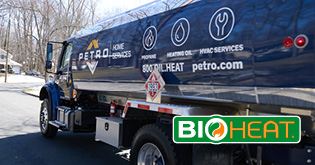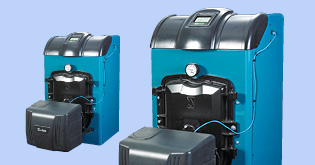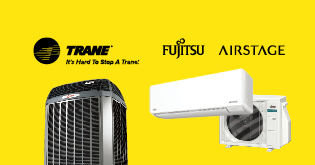- My Account:
- Sign In
- Register
- Make Payment

Propane safety tips for homes and businesses.
Propane use – safe handling tips and information.
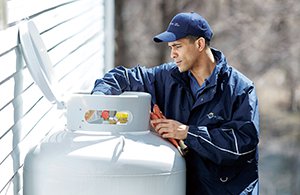
We can all agree that propane gas can be an affordable and efficient way to heat your home, get hot water, cook and generate electricity. But it's important that you follow propane safety best practices and use caution when handling tanks, fuel lines, appliances and generators to ensure safety. When handled properly, propane is a very versatile and safe fuel.
While Petro Home Services may not service smaller portable propane tanks, we care about safety. As your local propane pros, we’re committed to sharing best practices and helpful tips to ensure safe propane use, no matter the tank size or setup. Below are propane safety tips that are important for everyone who uses propane to power their home.
When handled properly, propane is a very versatile and safe fuel.
1. Handle propane tanks carefully.
- Don’t use or store portable propane tanks in basements or living spaces
- Storing tanks in enclosed areas can allow leaking propane to accumulate and pose fire risks, as propane is heavier than air and sinks to low points
- Properly secure portable propane tanks when transporting
- Do not leave portable propane tanks in cars or closed vehicles
- Secure temporary tanks when used for building heat, hot water, or cooking
- Contact a qualified propane service retailer to connect tanks to appliances
- Check for certification tags or recertification dates on tanks and deliver that info. Always verify propane tanks are current with recertification; expired cylinders pose a pressure hazard
How propane tank recertification works.
Propane tanks must be recertified periodically to ensure they remain safe for use. Most portable propane cylinders (like 20lb. grill tanks) require recertification 12 years after the original manufacture date, and then every 5 or 10 years thereafter, depending on the method used.
Key recertification details:
- Where to find the date: Look for a stamped month/year (e.g., “08 13”) on the tank collar that indicates August 2013
- After initial certification:
- 12 years from the manufacture date is the first required recertification
- After that, tanks may be recertified for 5 or 10 years, depending on the method (visual inspection vs. pressure test).
- Who can do it: Only certified propane retailers or licensed inspectors can recertify propane tanks
- What happens if expired: Expired tanks cannot be refilled; they must be recertified or replaced
Tip: Always check your tank’s certification before a refill. It can save you time and frustration.
2. Use propane gas appliances with care.
- Do not use propane gas BBQ grills inside – even with good ventilation, using grills indoors can result in carbon monoxide buildup
- Refrain from using propane stoves or ovens for space heating – these appliances are not designed for prolonged use and may not vent gases properly
- Do not use portable electric generators indoors and keep them outside of the building – place them at least 20 feet away from doors, windows, and vents to avoid carbon monoxide poisoning
- Have a qualified propane service technician connect appliances and perform a leak test – professionals ensure connections are secure and systems are safe to operate
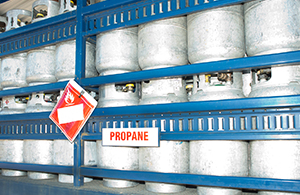
Related: How to safely use a propane grill.
Safe pilot light practices.
If your propane appliance has a pilot light:
- It is always best to call a qualified technician to troubleshoot any pilot light issues
- If the pilot light won’t stay lit or smells of gas, shut off the appliance and call a qualified technician
- Frequent pilot light issues could indicate ventilation blockages, gas pressure problems, or appliance defects
3. What to do if you smell gas.
If you detect even a faint "rotten egg" smell (there is an odorant added to propane to generate this smell), treat it as a potential emergency. Take the following actions immediately:
Step-by-step response guide.
- Step 1: Immediately extinguish all smoking materials, open flames, and any source of ignition
- Step 2: Get everyone out of the area where you suspect the gas is leaking
- Step 3: If it’s safe to do so, turn off the gas supply valve on your propane tank
- Step 4: Once you are safely away, contact your propane supplier. If you cannot reach them, call 911 or your local fire department immediately
- Step 5: Do not return to the area until your propane retailer, emergency responder, fire department or a qualified service technician has confirmed it is safe
- Step 6: Get your system checked. Before using any propane appliances, a qualified technician must inspect the entire system for leaks and ensure everything is functioning safely
Tip: Some propane providers offer 24/7 emergency hotlines—save the number in your phone or post it near your tank or appliances.
Should I open windows if I smell propane?
Yes—but only after extinguishing all flames and before leaving the area. Opening windows can help ventilate the space and prevent propane buildup, which lowers the risk of fire or explosion.
Important: Do not turn on fans, lights, or electrical switches when you smell gas, as they could ignite propane vapors.
4. Do not run out of gas!
Waiting till your propane tank runs out of fuel to refill it isn’t the best way to save on propane. In fact, running out of gas can be hazardous.
Serious safety hazards, including fire, explosion, or carbon monoxide exposure, can result from an empty propane tank. Here's why:
- If an appliance valve or gas line is accidentally left open when your propane supply runs out, it can cause a gas leak once the system is refilled
- Air and moisture may enter an empty or depleted tank, leading to internal rust, which can reduce the concentration of propane’s odorant and make leaks harder to detect
- If your propane tank runs out of gas, any pilot lights on your appliances will go out
- Relighting pilot lights without leak checks is dangerous and may result in the ignition of leaked gas.
Always schedule your next propane delivery before your tank drops below 20%.
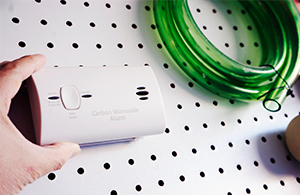
5. A leak check is required.
In many states, a propane retailer or a qualified service technician must perform a leak check before turning on the gas, especially after any interruption in service.
Example (Massachusetts): Per local ordinances in Massachusetts, once gas is turned on to a newly installed or previously tested and inspected piping system, the connected appliances must be checked for leakage and proper operation, and any detected leaks must be remediated before activating the appliance.
Step-by-step leak check process:
- The technician arrives and visually inspects the propane piping and appliance connections
- Perform leak test (e.g., with a gas leak detector or soapy water), alongside checking odorant levels—to ensure propane odor is present
- Confirm pilot lights and appliances are relit safely and operating correctly
6. Set up a regular propane delivery schedule.
Establish a regular propane delivery schedule with your chosen propane supplier to ensure your home or business always has the necessary fuel.
- Check your tank gauge frequently to avoid an unexpected run-out
- If the fuel level drops below 20%, call your propane provider immediately to schedule a delivery
- Consider installing a smart propane tank monitor or remote sensor for real-time tracking and delivery automation
Avoid run-out risk: Running out of propane can lead to dangerous leaks when service resumes and may require costly system rechecks.
7. What is odor loss?
Odor loss occurs when propane’s characteristic “rotten egg” smell becomes less noticeable. This is dangerous because you may not detect a leak.
Causes of odor loss:
- Air, water, or rust inside a tank or cylinder can reduce odorant levels
- If propane is leaking underground, it may lose its smell as it passes through the soil
- Propane odor may absorb into piping or materials, decreasing its strength over time
Important: Always treat even a faint propane smell seriously. If in doubt, evacuate and call your propane supplier or 911.
8. Consider installing propane gas detectors.
Sometimes, a leak may occur without any detectable smell due to odor loss or diminished human senses. That’s why installing propane gas detectors is critical.
- Propane detectors sound an alarm when propane concentrations reach unsafe levels
- They operate independently of odorant levels, offering added security
- Place detectors on every level of your home and near propane appliances, per UL standards.
- Also, consider installing a carbon monoxide alarm in case of incomplete combustion
Maintenance tips:
- Replace batteries annually
- Test detectors monthly
- Buy only UL-listed models and follow the manufacturer’s installation instructions
Related: Learn about carbon monoxide safety.
9. Recognizing signs of propane and CO issues.
Watch for these early signs of propane or carbon monoxide (CO) dangers:
- Blue flame is normal; yellow or orange indicates incomplete combustion and CO risk
- Soot or black residue around burners or vents
- Pilot light keeps going out—may indicate pressure, vent, or appliance issues
- Smell clues: faint “rotten egg” odor, hissing sound, or odor “snap back” after passing through porous surfaces
10. Propane in extreme weather.
Weather extremes can affect propane tank performance and safety. Here’s how to prepare:
- High heat: Keep tanks away from direct sunlight and flammable debris; maintain a 10-ft clearance
- Floods or high water: Shut off gas, evacuate, and wait for a technician. Tanks may float and rupture
- High wind/hail/lightning: Secure outdoor tanks; monitor for dislodgement
- Winter: Remove snow/ice buildup from regulators and vents; use a broom, not a shovel
Safety tip: Ask your provider about storm-proofing accessories for tanks in severe weather regions.
Propane safety FAQs.
Q: What should I do if my propane runs out?
A: Call your propane supplier and do not attempt to relight pilot lights until a technician performs a leak check.
Q: How often should my tank be inspected?
A: Tanks should be visually inspected at each delivery, and recertified every 5–12 years, depending on the tank and method.
Q: Can I store a propane tank indoors?
A: No. Portable tanks should never be stored in enclosed spaces like garages, sheds, or basements due to fire risks.
Q: How do I safely relight a pilot light?
A: It is recommended to have a qualified technician to troubleshoot or address any pilot light issues. If you do attempt it yourself, always follow manufacturer instructions. If unsure, call
a technician. Never use an open flame or a tool to manipulate controls.
Check out more propane resources.
Need help? Schedule a safety inspection.
Concerned about a leak, unusual smell, or appliance issue? Call your local propane pros at Petro at 800.645.4328 or schedule a technician visit online for a propane safety inspection.
Sources:
- U.S. Department of Transportation (DOT) – Cylinder Recertification Intervals 49 CFR § 180.209. Describes requalification periods for propane cylinders (5, 10, or 12 years depending on method).
- PHMSA (Pipeline and Hazardous Materials Safety Administration)
Petro Home Services is proud to not only serve communities in DC, CT, MA, MD, NJ, NY, PA, and RI but we also proudly acknowledge the skills and experience of our expert team behind all resources. With insights on topics ranging from heating oil facts to common air conditioning questions, you can rely on Petro Home Services for facts and information to help you understand more about your heating, cooling and home comfort needs. This article and all articles on the Petro Home Services website have been approved by our team of home service experts.

